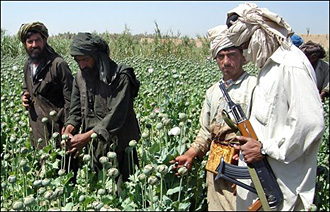
|  |  |  Americas & Beyond | October 2008 Americas & Beyond | October 2008  
Nato to Attack Afghan Opium Labs
 BBC News BBC News
go to original


| | The opium trade is helping bankroll the Taleban insurgency, the US says. | | |
Nato has agreed its troops will be allowed to attack opium factories for the first time in Afghanistan.

Alliance spokesman James Appathurai said troops will act with Afghan forces "against facilities and facilitators" using drugs to finance the Taleban.

Such counter-narcotics operations have until now been carried out by Afghan forces. The US wants more aggressive tactics against the opium trade.

Nato defence ministers reached agreement at a meeting in Budapest.

Nato's International Security and Assistance Force (Isaf) and US-led troops have until now concentrated on eradicating poppy crops, rather than attacking opium factories and distribution networks.

Some Nato members have been wary of the anti-drug mission, fearing that any crackdown would prompt a violent backlash against allied troops.

Mr Appathurai said participation would be "subject to the authorisation of respective nations".

He gave few further details. Nato defence ministers will review the mission in February.

Nato is also stressing this is only a temporary expansion of the Nato mission until Afghan security forces are deemed able to do the job on their own.

Afghanistan supplies more than 90% of the world's illicit opium, the main ingredient of heroin.

US Defence Secretary Robert Gates welcomed the Nato decision.

"Secretary Gates is extremely pleased that... Nato has decided to allow Isaf forces to take on the drug traffickers who are fuelling the insurgency, destabilising Afghanistan and killing our troops," said Pentagon press secretary Geoff Morrell.

On Thursday Afghanistan's Defence Minister Abdul Rahim Wardak addressed the Nato meeting.

"We've asked Nato to please support us, support our effort in destroying the labs and also the interdiction of the drugs and the chemical precursors that are coming from outside the country for making heroin," he told reporters afterwards.

'Scourge'

Nato's top operations commander, Gen John Craddock, also attended the Budapest talks to push for more concerted action by alliance members.

He told them the Afghan opium trade is bankrolling the Taleban insurgency to the tune of $100m (£57m) a year.

"You cannot have a safe and secure environment with a scourge of narcotics rampant," he told Reuters news agency on Thursday.

His remarks come amid anxiety that opium production far exceeds global demand and that international drug cartels must have stockpiled huge quantities.

The head of the UN Office on Drugs and Crime, Antonio Maria Costa, is urging the international community to "find the missing opium".

"These stockpiles are a time bomb for public health and global security," he has said.

It is estimated that bumper poppy harvests have yielded twice as much opium as needed to satisfy every known heroin user on the planet.

British law enforcement officers working undercover in southern Afghanistan are reporting seizures of "enormous quantities of precursors" - the chemicals required to process opium - suggesting vast amounts of heroin may be hidden in the lawless region.

The UN said in August that poppy production in Afghanistan was down this year after a record-breaking harvest in 2007.

But the southern region of Helmand, a Taleban stronghold, accounts for nearly 66% of all Afghan opium, from which heroin is obtained.

|

 |
|  |



